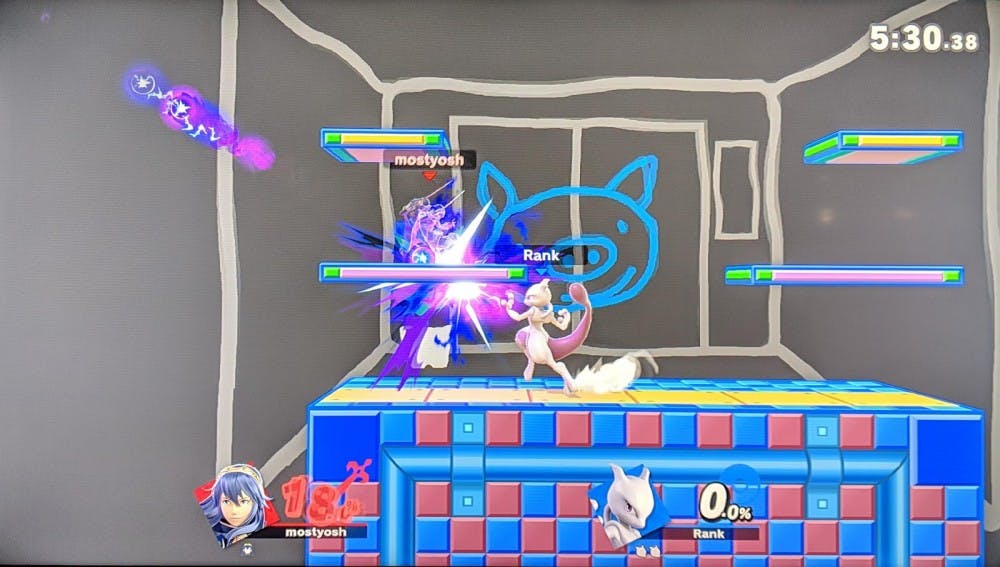Although the University of Richmond might not currently have its own varsity esports program, campus clubs and community gaming centers suggest that competitive gaming is present and growing in Richmond, following a national trend.
More than 1.8 million views were recorded for people tuning in to watch Frostbite 2019, an esports tournament specializing in the popular Nintendo fighting game "Super Smash Bros." Compare that number with the roughly 300,000 views registered for those who watched Frostbite 2018, and you can see that now more than ever, esports have been catapulted into the mainstream.
On campus are clubs such as UR Smash, which plays and occasionally competes in "Super Smash Bros." tournaments. Every week, the club meets to play the latest in the "Super Smash Bros." series, 2018's "Super Smash Bros. Ultimate."
The club is open to anyone, regardless of their level of play, but some students choose to compete in tournaments to test their skills, including junior Connor Kissane.
Kissane said he had started playing "Super Smash Bros." casually when he was young, and had more recently gotten into competitive play in order to further improve. He says he enjoyed playing in tournaments because it was a way to see how one had bettered their gameplay.
"It shows you how good you are,” Kissane said. “I can feel like I’m getting better just playing with my friends at home, but you don’t really know unless you get into a tournament.”
Players from the UR Smash club occasionally compete at The Forge, a local community gaming center run by Josh Maston. The center is a collection of monitors and gaming systems where anyone can come, pay a fee and play.
The Forge hosts tournaments for "Super Smash Bros." every Sunday, and hosts tournaments for a variety of other games during the week. Maston took over The Forge around a year ago and sees the center’s future being focused on community, he said.
Maston said he wanted to build a grassroots movement by having a place where people – everyone from the most casual gamer to the professional gamer – could come together and build a community around their love of games and gaming.
“It doesn’t matter what game it is, or what their belief system is,” Maston said. “At the core of it all is they like the same things that you like. It's almost like a brotherhood.”
He also wants to turn The Forge into a place where competitive gamers can be recruited. On each machine is a system that tracks the statistics of each player for each game. The goal is for statistics of the best players to be sent to recruiters so that players can have a chance to be signed to one of the many professional esports teams across the country.
For some players in the UR Smash club, going to The Forge is an opportunity to practice playing in a competitive environment. Usually, only the most serious players come because the weekly tournaments have a buy-in.
Enjoy what you're reading?
Signup for our newsletter
First-year Hyewon Hong joined the UR Smash club at the beginning of this school year and played at one of The Forge’s weekly "Smash" tournaments, he said.
“It’s a good learning experience,” Hong said. “It's all really friendly. Everyone’s super nice. But there is a serious aspect to it because everyone is there with money on the line to get better.”
Hong said that even though he had not placed as well as he had hoped, the atmosphere had always been positive. People would give tips and advice to help others, even people whom they competed against, he said.
Other colleges and universities have started to fund varsity esports programs as well. Schools such as the University of California – Irvine, Miami University of Ohio, Georgia State University and many others have started varsity esports programs.
There are currently more than 130 member schools recognized by the National Association of Collegiate Esports, a nonprofit association that, according to its website, is “the only association of varsity esports programs at colleges and universities across the U.S.”
As of January 2018, over 94 percent of all varsity esports programs in the U.S. are members of NACE, the website stated.
Contact contributor Andy Erickson at andrew.erickson@richmond.edu.
Support independent student media
You can make a tax-deductible donation by clicking the button below, which takes you to our secure PayPal account. The page is set up to receive contributions in whatever amount you designate. We look forward to using the money we raise to further our mission of providing honest and accurate information to students, faculty, staff, alumni and others in the general public.
Donate Now



